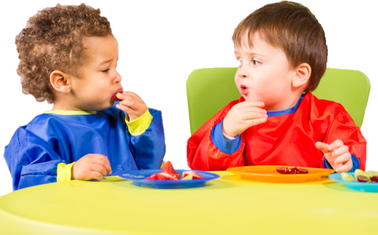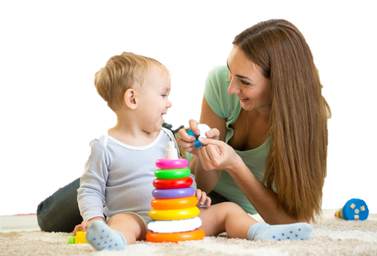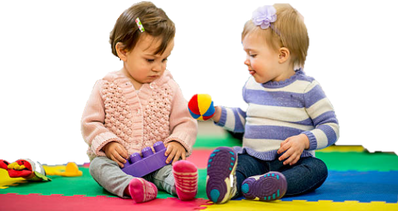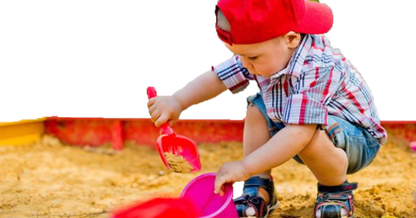Do you provide meals?

Mealtimes are central to our routines and culture here at Bridge Street.
As part of respecting children's individual preferences and whanau cultural values around food, we have each child bring in packed lunch boxes from home.
We are part of the Healthy Heart programme and therefore encourage healthy lunches with very limited packaged food.
Please visit the Healthy Heart Foundation or Forbaby (see the finger food ideas) or speak to any of the teachers at Bridge Street for some more lunchbox inspiration.
As part of respecting children's individual preferences and whanau cultural values around food, we have each child bring in packed lunch boxes from home.
We are part of the Healthy Heart programme and therefore encourage healthy lunches with very limited packaged food.
Please visit the Healthy Heart Foundation or Forbaby (see the finger food ideas) or speak to any of the teachers at Bridge Street for some more lunchbox inspiration.
What is the child/teacher ratio?
The Ministry of Education ratios are one adult for every ten children over two years of age, and one adult for five infants and toddlers under the age of two years old.
At Bridge Street we are proud to provide ratios well within these guidelines.
At Bridge Street we are proud to provide ratios well within these guidelines.
What is the current price for full-time hours?

As a non-profit community based centre we work hard to keep our costs to families as low as possible.
We charge $6.10 per hour for under two's and $5.90 per hour for over two year olds.
We offer 20 hours ECE when a child turns three years of age; we can also support families applying for WINZ subsidies and administer Family Start payments.
We charge $6.10 per hour for under two's and $5.90 per hour for over two year olds.
We offer 20 hours ECE when a child turns three years of age; we can also support families applying for WINZ subsidies and administer Family Start payments.
How can I be involved?
We welcome and value parent and whanau input into your child's day to day programme and routine.
There is plenty of research to support that the outcomes for childrens learning and development is greater with parent and whanau actively involved in the childs early learning programme.
As a parent of a child at Bridge Street, you will communicate on a daily basis with your child's teaching team; you will be invited frequently via Storypark to collaborate with teachers on your child's learning; you will be invited to our excursions, family days, working bees and fundraisers.
There is plenty of research to support that the outcomes for childrens learning and development is greater with parent and whanau actively involved in the childs early learning programme.
As a parent of a child at Bridge Street, you will communicate on a daily basis with your child's teaching team; you will be invited frequently via Storypark to collaborate with teachers on your child's learning; you will be invited to our excursions, family days, working bees and fundraisers.
Will a particular teacher be responsible for my child?

Yes. In our Potiki room we run our programme with a Primary caregiver model which ensures that each child is assigned (or chooses) his/her own teacher to be their 'special' person whilst attending Bridge Street.
Our primary caregiver model also allows for a shadow teacher to develop
a relationship with your child and whanau, ensuring that in times of leave or when your primary teacher is out of the room, your child still has a supportive and nurturing person to share time with.
In our Teina/Tuakana room we operate with a key caregiver model.
This is similar to the Primary caregiver model in that during your transition to our centre you will have a key teacher to support both tamariki and whanau. This teacher also has overall responsibility for planning and assessment to support and guide the childs growing learning and development.
Our primary caregiver model also allows for a shadow teacher to develop
a relationship with your child and whanau, ensuring that in times of leave or when your primary teacher is out of the room, your child still has a supportive and nurturing person to share time with.
In our Teina/Tuakana room we operate with a key caregiver model.
This is similar to the Primary caregiver model in that during your transition to our centre you will have a key teacher to support both tamariki and whanau. This teacher also has overall responsibility for planning and assessment to support and guide the childs growing learning and development.
How many children are in the group at any one time?
We have a very small family friendly centre. We are licenced for 30 children including up to 10 children under 2 years old.
What does Bridge Street think is important for children's learning?

We believe that for children to succeed in their learning journey that they must have responsive, reciprocal and nurturing relationships with kaiako (Teachers)
We are strongly influenced by a 'learning through play' philosophy and provide both structured and unstructured play opportunities to support children in gaining the necessary skills and dispositions to become successful lifelong learners.
Our role as teachers is to assist children in developing healthy social competencies. We believe children are active participants in their own learning and need time and space to explore and develop their own working theories. We believe strong relationships with families and whanau are critical for children's successful learning journeys.
How do I transition my child into Bridge Street Kindergarten?
Each child and family are offered two free settling sessions with parents/whanau and caregivers of at least three hours in duration.
As we absolutely realise all children are individuals and sometimes it may take a little longer for children to settle into new environments. With this in mind, you and your family are welcome to visit as often and as long as you like until both whanau and child are settled and showing signs of being comfortable to be left without the parent.
As we absolutely realise all children are individuals and sometimes it may take a little longer for children to settle into new environments. With this in mind, you and your family are welcome to visit as often and as long as you like until both whanau and child are settled and showing signs of being comfortable to be left without the parent.

At Bridge Street we provide an environment where tamariki are supported to develop their social and emotional competence and appropriate behaviour.
In our Tuakana/Teina room with the children we have developed a 'Treaty' which sets out expectations for behaviour and we revisit this regularly.
Many of our teachers have attended the 'Incredible Years' programme and we implement a range of strategies focused on positive behaviour strategies.
If there is an ongoing concern about a child's behaviour, we will work with the whanau (and if necessary outside agencies) to develop consistent positive behaviour strategies between home and the centre.
In our Tuakana/Teina room with the children we have developed a 'Treaty' which sets out expectations for behaviour and we revisit this regularly.
Many of our teachers have attended the 'Incredible Years' programme and we implement a range of strategies focused on positive behaviour strategies.
If there is an ongoing concern about a child's behaviour, we will work with the whanau (and if necessary outside agencies) to develop consistent positive behaviour strategies between home and the centre.
What should my child wear, and will he or she need spare clothes?

As part of our programme we often have painting, messy play, mud play, water play and sand play available throughout our day and there is an expectation that children may go home with clothes that have evidence of a productive day.
We do not provide aprons for children's play as we feel that this inhibits their natural curiosity and learning agendas.
Therefore we suggest your child has clothes specifically for their time with us at Bridge Street that you are comfortable to get messy. We also have regular walks (to visit local schools, parks and to be part of our community) so please bring along appropriate footwear.
Finally, please consider the seasons (ie Sunhats are required in the warm months and beanies are great for the cooler months) as we have a strict 'must wear hats' in Summer culture.
We do not provide aprons for children's play as we feel that this inhibits their natural curiosity and learning agendas.
Therefore we suggest your child has clothes specifically for their time with us at Bridge Street that you are comfortable to get messy. We also have regular walks (to visit local schools, parks and to be part of our community) so please bring along appropriate footwear.
Finally, please consider the seasons (ie Sunhats are required in the warm months and beanies are great for the cooler months) as we have a strict 'must wear hats' in Summer culture.
Where can I find your most recent ERO review?
The full review is available here

